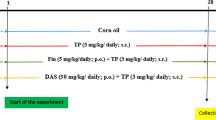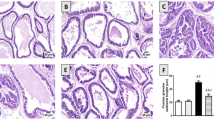Abstract
Purpose
We aimed to investigate whether icaritin (ICT) would inhibit serum proinflammatory cytokines and postpone prostate cancer (PCa) development and progression in both normal diet and high-fat diet (HFD) transgenic adenocarcinoma mouse prostate (TRAMP) mice.
Methods
TRAMP mice were randomly divided into four groups: normal diet with/without ICT group and HFD with/without ICT group. Each TRAMP mouse received intraperitoneal injection of ICT solution at the dose of 30 mg/kg 5 times per week.
Results
ICT treatment could significantly increase the survival when compared with those in normal diet group (P = 0.015, log-rank test) and HFD group (P = 0.009, log-rank test). Proinflammatory cytokine levels, including IL-1α, IL-1β, IL-6, and TNF-α, were decreased more or less in ICT-treated TRAMP mice. Moreover, significant higher inflammation scores were detected in normal diet group and HFD group compared with their relevant ICT treatment groups (P = 0.026 and P = 0.006, respectively). Meanwhile, the incidences of well-differentiated tumor tissue in two ICT treatment groups (39.13 and 31.82 %) were moderately higher than control groups (29.41 and 20.00 %, respectively), though no significant difference was observed.
Conclusions
Taken together, our findings indicate that ICT could inhibit the development and progression of PCa in TRAMP mice via inhibiting proinflammatory cytokines.


Similar content being viewed by others
References
Siegel RL, Miller KD, Jemal A (2015) Cancer statistics, 2015. CA Cancer J Clin 65:5–29
Hsing AW, Tsao L, Devesa SS (2000) International trends and patterns of prostate cancer incidence and mortality. Int J Cancer 85:60–67
Fleshner N, Bagnell PS, Klotz L, Venkateswaran V (2004) Dietary fat and prostate cancer. J Urol 171:S19–S24
Lophatananon A, Archer J, Easton D et al (2010) Dietary fat and early-onset prostate cancer risk. Br J Nutr 103:1375–1380
Xu H, Hu MB, Bai PD, Zhu WH, Ding Q, Jiang HW (2014) Will metformin postpone high-fat diet promotion of TRAMP mouse prostate cancer development and progression? Int Urol Nephrol 46:2327–2334
Xu H, Jiang HW, Ding Q (2015) Insulin-Like growth factor 1 related pathways and high-fat diet promotion of transgenic adenocarcinoma mouse prostate (TRAMP) cancer progression. Actas Urol Esp 39:161–168
Xu H, Hu MB, Bai PD et al (2015) Proinflammatory cytokines in prostate cancer development and progression promoted by high-fat diet. Biomed Res Int 2015:249741
Wo YB, Zhu DY, Hu Y, Wang ZQ, Liu J, Lou YJ (2008) Reactive oxygen species involved in prenylflavonoids, icariin and icaritin, initiating cardiac differentiation of mouse embryonic stem cells. J Cell Biochem 103:1536–1550
Wang Z, Wang H, Wu J et al (2009) Enhanced co-expression of beta-tubulin III and choline acetyltransferase in neurons from mouse embryonic stem cells promoted by icaritin in an estrogen receptor-independent manner. Chem Biol Interact 179:375–385
Li Q, Huai L, Zhang C et al (2013) Icaritin induces AML cell apoptosis via the MAPK/ERK and PI3 K/AKT signal pathways. Int J Hematol 97:617–623
Zhu S, Wang Z, Li Z et al (2015) Icaritin suppresses multiple myeloma, by inhibiting IL-6/JAK2/STAT3. Oncotarget 6:10460–10472
Wang ZQ, Lou YJ (2004) Proliferation-stimulating effects of icaritin and desmethylicaritin in MCF-7 cells. Eur J Pharmacol 504:147–153
Li S, Priceman SJ, Xin H et al (2013) Icaritin inhibits JAK/STAT3 signaling and growth of renal cell carcinoma. PLoS ONE 8:e81657
Huang X, Zhu D, Lou Y (2007) A novel anticancer agent, icaritin, induced cell growth inhibition, G1 arrest and mitochondrial transmembrane potential drop in human prostate carcinoma PC-3 cells. Eur J Pharmacol 564:26–36
Greenberg NM, DeMayo F, Finegold MJ et al (1995) Prostate cancer in a transgenic mouse. Proc Natl Acad Sci U S A 92:3439–3443
Kawata H, Ishikura N, Watanabe M, Nishimoto A, Tsunenari T, Aoki Y (2010) Prolonged treatment with bicalutamide induces androgen receptor overexpression and androgen hypersensitivity. Prostate 70:745–754
Hara T, Miyazaki J, Araki H et al (2003) Novel mutations of androgen receptor: a possible mechanism of bicalutamide withdrawal syndrome. Cancer Res 63:149–153
Sun F, Indran IR, Zhang ZW et al (2015) A novel prostate cancer therapeutic strategy using icaritin-activated arylhydrocarbon-receptor to co-target androgen receptor and its splice variants. Carcinogenesis 36:757–768
Gingrich JR, Greenberg NM (1996) A transgenic mouse prostate cancer model. Toxicol Pathol 24:502–504
Gingrich JR, Barrios RJ, Morton RA et al (1996) Metastatic prostate cancer in a transgenic mouse. Cancer Res 56:4096–4102
Kwon OJ, Zhang L, Ittmann MM, Xin L (2014) Prostatic inflammation enhances basal-to-luminal differentiation and accelerates initiation of prostate cancer with a basal cell origin. Proc Natl Acad Sci USA 111:E592–E600
Elkahwaji JE, Hauke RJ, Brawner CM (2009) Chronic bacterial inflammation induces prostatic intraepithelial neoplasia in mouse prostate. Br J Cancer 101:1740–1748
De Marzo AM, Platz EA, Sutcliffe S et al (2007) Inflammation in prostate carcinogenesis. Nat Rev Cancer 7:256–269
Xu H, Ding Q, Jiang HW (2014) Genetic polymorphism of interleukin-1A (IL-1A), IL-1B, and IL-1 receptor antagonist (IL-1RN) and prostate cancer risk. Asian Pac J Cancer Prev 15:8741–8747
Kutikov A, Makhov P, Golovine K et al (2011) Interleukin-6: a potential biomarker of resistance to multitargeted receptor tyrosine kinase inhibitors in castration-resistant prostate cancer. Urology 78:968.e7–e11
Nguyen DP, Li J, Tewari AK (2014) Inflammation and prostate cancer: the role of interleukin 6 (IL-6). BJU Int 113:986–992
Wallner L, Dai J, Escara-Wilke J et al (2006) Inhibition of interleukin-6 with CNTO328, an anti-interleukin-6 monoclonal antibody, inhibits conversion of androgen-dependent prostate cancer to an androgen-independent phenotype in orchiectomized mice. Cancer Res 66:3087–3095
Michalaki V, Syrigos K, Charles P, Waxman J (2004) Serum levels of IL-6 and TNF-alpha correlate with clinicopathological features and patient survival in patients with prostate cancer. Br J Cancer 90:2312–2316
Nakashima J, Tachibana M, Ueno M, Miyajima A, Baba S, Murai M (1998) Association between tumor necrosis factor in serum and cachexia in patients with prostate cancer. Clin Cancer Res 4:1743–1748
Acknowledgments
This study was sponsored by the National Natural Science Foundation of China (81272835).
Author information
Authors and Affiliations
Corresponding author
Ethics declarations
Conflict of interest
The authors declare that they have no conflict of interest.
Ethical approval
All applicable International, National, and/or Institutional Guidelines for the care and use of animals were followed.
Additional information
Jimeng Hu and Tian Yang contributed equally to this work and should be considered co-first authors.
Rights and permissions
About this article
Cite this article
Hu, J., Yang, T., Xu, H. et al. A novel anticancer agent icaritin inhibited proinflammatory cytokines in TRAMP mice. Int Urol Nephrol 48, 1649–1655 (2016). https://doi.org/10.1007/s11255-016-1341-9
Received:
Accepted:
Published:
Issue Date:
DOI: https://doi.org/10.1007/s11255-016-1341-9




